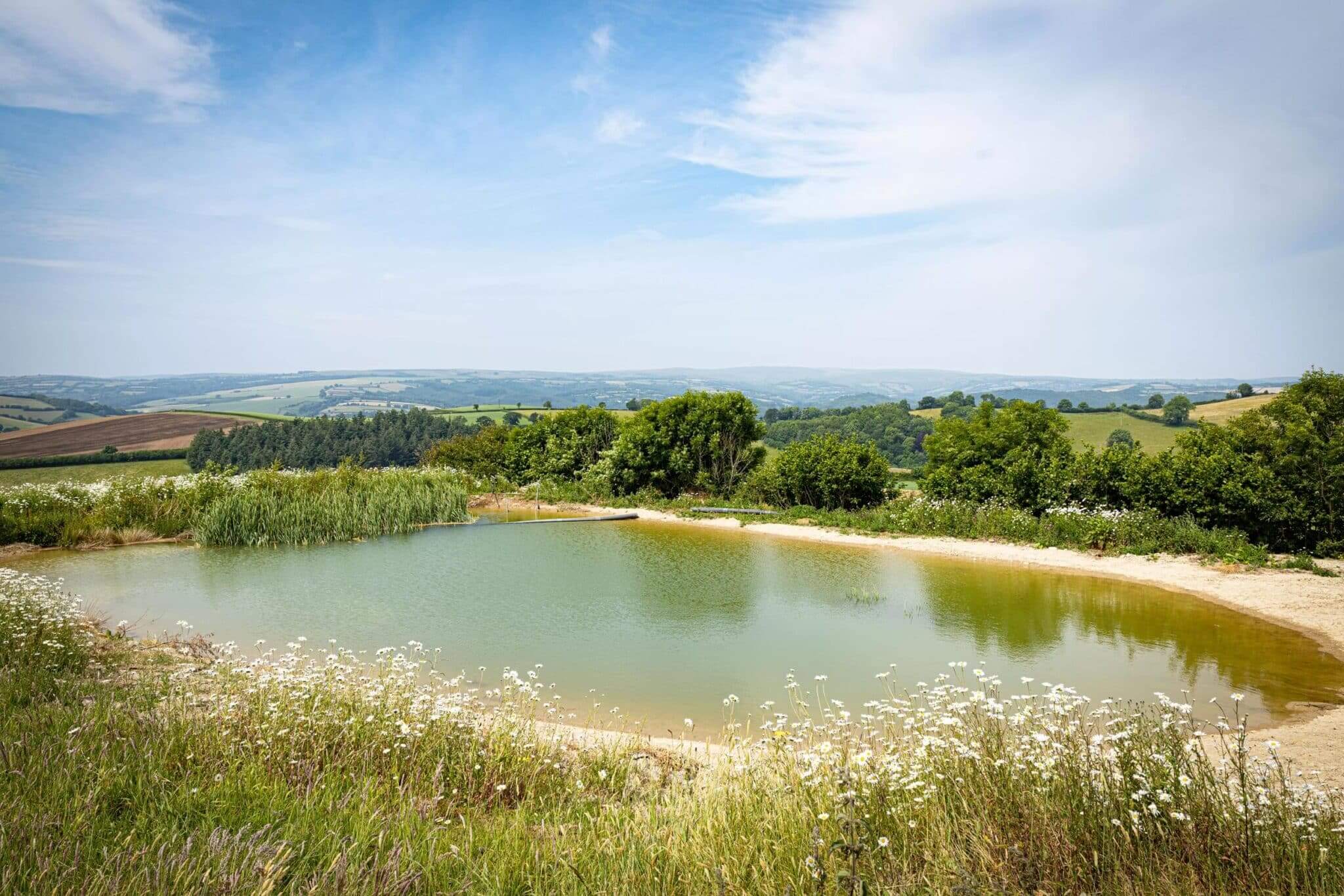I’m typing this with the sun on my back and mating dragonflies dancing over the water of our reservoir at my feet. A family of geese watch resentfully as I take their favoured spot on the boardwalk. With no significant rain in six weeks, my feet are now dangling above the water; last week, they would have been submerged, nibbled by the last metamorphosing tadpoles before they leave the water to search for slugs in our strawberries.
Recent thunderstorms have largely missed the South West. Almost as significant as the lack of rain has been a month of dry easterly winds, mercilessly sucking water from leaves. The gentle, rain-giving westerly winds which normally dominate, bringing humid air off the sea, seem to be another unexpected casualty of climate change. We have already started rationing water according to need and value, with late artichokes being abandoned and cabbages having a restricted supply.
It costs about £3 per cubic metre to build a clay-lined reservoir that is filled in winter, for use in summer. By most reasonable accounting, that suggests an annual cost of about 60p per cubic metre of water. Pennon Group, our monopoly-wielding local water company, charges £1.93 per cubic metre for a restricted supply of water, plus an additional £3.23 per cubic metre for associated sewage treatment.
Obviously they have pipes to maintain and so on – but since they were privatised 30 years ago, the UK’s sewage-spilling water companies have paid out a staggering £72 billion in dividends, and not built a single reservoir. Perhaps naively, I thought dividends were paid out of profits, having made provision for necessary investments – but Pennon Group proudly boasts about its policy of increasing dividends annually by two per cent ahead of inflation, regardless of sewage spills, leaking pipes and hose pipe bans. This is jaw-droppingly insensitive to those of us vomiting after swimming in the River Dart.
With a little imagination and good design, reservoirs can add hugely to biodiversity and even be used to reduce flood risk. Ours also offer welcome swimming for co-owners and close neighbours. When veg picking is finished in the afternoon, the geese will have to contend with an ever-changing group swimming, diving and chilling on the banks. And having got all hot and bothered about capitalist economics, it is time for a swim myself.
You can sign Surfers against Sewage’s petition with a list of demands to demand action from water companies here.










Spot on article as always, Guy! Readers, please sign the petition (link above) and if you’re one of the lucky South West Water customers that took the share offer (instead of £20 off your bill) you can attend the AGM like I did a couple of years ago and ask them why their CEO gets over £1m annually whilst their infrastructure dept claims to have no budget to fix the sewerage system that overflows regularly into the rivers 😉
What sort of answer did you get?
By the way, I live in the Wessex Water area, and I hear people are leaving them because it’s difficult to get maintenance and improvement budgets passed by management; control of expenditure (and maintenance of dividend) appears to have been tightened recently.
In answer to Chris: South West Water answered my question in two parts by two separate people. HR representative said that their pay and bonus scheme is in line with industry standards, and the infrastructure rep said the infrastructure is old and crumbling and they don’t have the money to fix it. How are people leaving a water supplier? Each part of the country is supplied by one supplier, it’s a monopoly with no competition – they have no need to improve.
The petition is a great idea and have signed numerous similar online petitions.
However,if we really want the sewage pumpers to suffer we must ALL stop paying our bills.
Guy, I agree that water companies should invest in addressing the issues rather than dividends etc but your claims about costs come under the heading of misinformation, which I would hope not get on a piece of paper in my veg box. Water companies treat both (normally) our drinking water and our wastewater. This requires massive infrastructure and operating costs that cannot be compared to your clay lined reservoir, which is of course a good idea, in its own right.
The £1.93 per cubic metre for drinking water covers abstraction, treatment to EU standards and distribution via a complex network. Everyone in this country has access to safe drinking water, which probably should not be used to water crops. Hose pipe bans are about conserving a precious resource during times of drought. What other options are there? Many people in the world do not have access to safe drinking water.
The £3.23 covers similar for sewage before it is discharged into the sea or a river. Normally only treated sewage is discharged. Yes, it is a problem when raw sewage is discharged but this is not the norm, although it may be on the increase. Reasons for this can include the poor management you describe, or they can be due to extreme weather and many other things.
Vomiting after swimming in the River Dart could be caused by ingesting contaminated water or it could be anything else. The rivers and the sea are not fit for drinking, regardless of whether raw sewage has been discharged. All water bodies have animals living there, all potentially excreting pathogens. The river Dart has an agricultural catchment and so will contain pathogens from farm animal waste (e.g cryptosporidium and coliforms). It would be very hard to prove it came from sewage rather than farm run-off or wildlife.
The trouble is when I read a misleading article on a topic about which I have expertise I then start wondering whether I should believe any of the other articles? How do I know?
I agree we should demand better from water companies or government but let’s stick to science and facts, please!
I can’t see any misinformation in Guy’s article… just the facts about the cost of water from the reservoir compared to costs from Pennon. Plus the facts about their dividends. Up to us to draw our own conclusions!
Great article about the topic that as a gardener with passion for sustainability is so close to me.
I must say that I have a little more hope as someone as big of an influencer is also interested and campaign over ‘our’ looking after resources that are NOT ours neither theirs (water companies) and still they draw profits from it!!!
I cannot believe that this day and age and sustainability crisis there is not more done also in building new homes – why do we have to flush our toilets with drinking water!? I don’t! I’d be much happier if my house came with a rainwater tank that had a system to flush my toilet with rainwater instead… Cannot be that hard… It should be compulsory as I see it, we all have roofs over our heads…